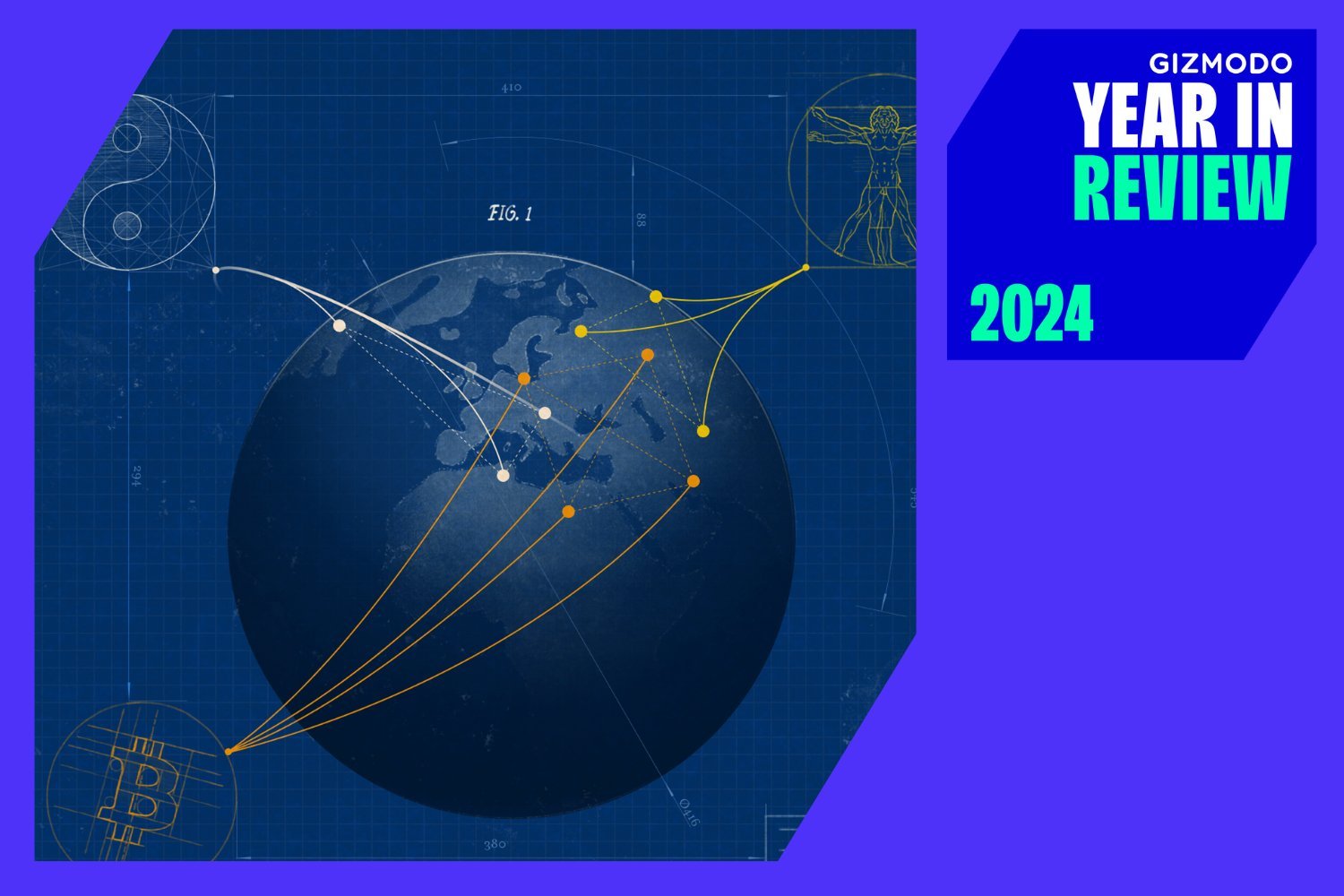Techno-Colonialism and the Network State Movement
The last few decades have seen the accumulation of an immense amount of wealth and power in the hands of a few Silicon Valley tech titans. At the same time that these executives have increasingly come to dominate our lives with their products and technologies, many of them have become disenchanted with the liberal political order that governs the Western democracies in which we live. Lately, they have spun that disenchantment into a techno-political movement that seeks to break with our current society and create a brave new world—one that they can shape and control.
The Network State movement has been called a “cult,” a “scam,” a “kooky” dystopia, and, by its supporters, “the future” of human civilization. It would be easy to write the movement off as a fanciful daydream of idle billionaires, were it not for the fact that hundreds of millions of dollars are currently being poured into making it a reality. Efforts are being made to build new cities all over the world, and these cities, in turn, are serving as a testing ground for the feasibility of the utopian techno-vision that undergirds their development.
What is a Network State?
The Network State movement was founded by Balaji Srinivasan, a former general partner at the powerful venture capital firm Andreessen Horowitz who has, for the past ten years, spent much of his time advocating for this new form of society which—he seems to earnestly believe—will eventually replace our current world with its own. Srinivasan has served as the movement’s intellectual leader, holding conferences, launching a podcast, and publishing a book, all in the hope of pushing his ideas into the mainstream.
Srinivasan has gone to great lengths to make his concept as straightforward as possible. In his 262-page manifesto, Srinivasan helpfully provides a one-sentence encapsulation of what his movement is all about: “A network state is a highly aligned online community with a capacity for collective action that crowdfunds territory around the world and eventually gains diplomatic recognition from pre-existing states.” A slightly longer definition, which Srinivasan also provides, reads:
“A network state is a social network with a moral innovation, a sense of national consciousness, a recognized founder, a capacity for collective action, an in-person level of civility, an integrated cryptocurrency, a consensual government limited by a social smart contract, an archipelago of crowdfunded physical territories, a virtual capital, and an on-chain census that proves a large enough population, income, and real-estate footprint to attain a measure of diplomatic recognition.”
In other words, a network state is—first and foremost—a digital phenomenon, a group of people with a common set of ideals and beliefs connected by the internet.
What separates it from a bunch of nerds in a chatroom? Mainly two things: 1) a plan to establish a new physical society and 2) a whole lot of money. Network Staters are immensely wealthy, highly organized, and, most importantly, dedicated to the notion that they can not only improve the current society but build a new one that will replace our own.
The Network State belief system coalesces around the concept of “exiting“—the idea that tech bros can leave or secede from our current society, shoving off for new techno-frontiers where their crypto-laced dreams can manifest.
At root, “exiting” implies the creation of a kind of marketplace of nations, a competitive landscape where people can pick and choose the countries they belong to in very much the same way you’d choose between different brands of cereal at the grocery store. As the above description notes, these new societies will have integrated cryptocurrencies, be privately funded and corporately governed, and function, more or less like anarcho-capitalist paradises.
That’s the idea, anyway. “What I’m really calling for is something like Tech Zionism,” Srinivasan said, in one interview, demonstrating the quasi-spiritual tenor with which he has sought to imbue his movement. Religious Zionism, notably, revolves around the idea of a divinely ordained homeland, the likes of which must be constructed from scratch by its global followers. Srinivasan has also said that the Network State movement can “reopen” the “physical frontier” through the creation of its global colonies—a strategy that his band of supporters and acolytes are working overtime to realize.
As you might expect, there are plenty of critics of this agenda. Many have referred to the Network State as a “neo-colonialist” project, a means by which wealthy Westerners can move into weaker, developing countries, and exploit their resources and limited government for financial gain. Indeed, the traversal of a “frontier” necessarily implies colonization, and to colonize territory, you must first dispossess the people living there of their legal and economic rights. As such, critics contend that the Network State movement treats the entire world as one big “frontier,” a virginal territory just waiting to be possessed.
The backers
While the full list of notable tech people involved with the Network State movement would be too numerous to list here, many of its projects can be tied back to just one organization: Pronomos Capital. A venture capital fund helmed by Patri Friedman (the grandson of free-market guru Milton Friedman), Pronomos is responsible for financially backing a majority of the Network State movement’s various projects.
Friedman has said that the benefit of his organization’s work is that it is creating communities that represent alternative governance models to the current standard, which is liberal Western democracy. “The idea, at a meta-level, is let’s try alternatives,” said Friedman, during a recent interview with Reason. Friedman added that these alternatives could represent a “tweak” of current democratic models, or could represent a total departure from democracy. The point, in Friedman’s formulation, is to give people options.
Yet despite its supposed ideal of challenging governance norms and escaping modern bureaucratic structures, the Network State movement is, ironically, being funded by the very companies and people responsible for propping up and profiting off of the U.S. government. Pronomos Capital is generously supported by tech billionaire Peter Thiel, who—in addition to funding many of Pronomos’s projects—also financially seeded Friedman’s Seasteading Institute, which is devoted to similar endeavors. Thiel continues to make much of his fortune through his company Palantir, a defense contractor that works with the highest levels of the U.S. government and was initially financed by the CIA. A number of Thiel associates are also deeply intertwined with the Network State movement. Joe Lonsdale, Palantir’s co-founder, has also provided funding for Pronomos, is listed as a “supporter” of the related Charter Cities Institute, and recently appeared on Srinivasan’s Network State podcast to promote the ideology. Michael Gibson, the former vice president of grants at the Thiel Foundation, also currently serves as an advisor at Pronomos.
Crypto’s ‘End Game’
The Network State movement is intrinsically tied to cryptocurrency, and it requires a certain understanding of where the crypto industry has been and where it wants to go to fully grasp what this belief system is all about. In 2021, the crypto industry saw a sudden glowup, enjoying increased adoption, celebrity endorsements, and a broader acceptance by the mainstream media. Then the FTX debacle happened, thrusting the crypto economy into turmoil and turning public sentiment against it. As mainstream interest in crypto has waned, its true believers have increasingly turned more radical. Many crypto entrepreneurs have poured money into the political system in the hopes of influencing U.S. policy, while others have increasingly embraced the Network State belief system, seeing it as the inevitable “end game” of web3’s efforts to transform society.
In an essay, media scholar Olivier Jutel writes that the crypto industry’s obsession with “Exit” and its pivot toward the Network State is a response, in part, to its failure to achieve the kind of mainstream integration it felt it was owed. Having failed to garner acceptance from society, web3 acolytes have now turned to rebellion and secession. “Exit denotes both a strategy and ideology,” Jutel writes. “As a financial strategy, exit is how investors realize value through liquidating an equity stake. Ideologically it is the libertarian ideal of exiting the state to settle new territories as a digital nomad.”
The legal strategy by which crypto bros plan to “Exit” the U.S. involves the use of a jurisdictional partition called a “Special Economic Zone,” or SEZ. In essence, SEZs are intra-national jurisdictions where the overarching regulatory rules do not apply. This allows monied special interests to move into those areas and essentially write their own regulatory and financial schemes, which are often designed to exclusively benefit businesses.
SEZs have provided the legal framework for the Network State’s colonization effort, which involves the establishment of what are known as charter cities. In essence, a charter city is a private city. The Charter City Institute, which enjoys ties to Pronomos, Friedman, and other people associated with the Network State movement, describes its mission thusly: “By improving governance through deep regulatory and administrative reforms, charter cities can help accelerate economic growth in developing countries and lift tens of millions of people out of poverty.” According to its proponents, charter cities give people the power to choose what kind of economic regime they want to live under.
Much like the charter school movement, the charter city movement deals with its proponents’ hostility to regulations and democratic governance structures by privatizing institutions, thus bringing them under the control of private wealth. The promise is that private wealth managers can solve life’s problems much more easily than government bureaucrats ever could. An essay written by the co-founder of Thebe Investment Management, an investment firm in Sub-Saharan Africa that enjoys ties to the Charter City Institute, and which is currently engaged in developing its own charter community, explains the supposed benefits of this arrangement like so:
…we believe these new cities, and the expansions of existing ones, will be financed and managed by private organizations such as ours. Private governance will likely be the norm across much of the developing world. It will create jobs, provide trusted institutions, affordable housing, and economic platforms for business creation and growth.
Yet if charter cities promise to solve many of the regulatory and governance issues that impact normal countries, their strategies for “solving” certain problems may involve just not addressing them at all. One example is labor rights. Indeed, a notable characteristic of SEZs is that they often have greatly reduced labor regulations and worker protections. This may help explain why Neom, the new city being constructed in Saudi Arabia (which has been tied to the Network State movement and is located inside an SEZ), has led to the deaths of so many migrant construction workers (reportedly, a whopping 21,000 people have died while building up the massive new urban project). Thus such setups are able to “solve” the problem of inefficient labor regulation by simply not protecting their workers.
Company towns: What the Network State movement has actually done
The most developed colony in the Network State movement is Prospera, a self-described “startup city” based on an island off the coast of Honduras that has alternately been described as a “for-profit” “town” and an “egregious” enclave for “libertarian wackos.” Founded in 2017 by a U.S. company, Prospera describes itself as having a “regulatory system designed for entrepreneurs to build better, cheaper, and faster than anywhere else in the world.” Indeed, Prospera claims to offer its entrepreneurial denizens the opportunity to “start a business in minutes.” The idea behind Prospera is relatively simple: low taxes, almost no regulations, and a corporate governance structure that seems to allow limited transparency or public oversight.
Prospera has also served as a breeding ground for new technologies that may suffer from too much regulatory scrutiny under more developed governments. Patri Friedman, of Pronomos, recently bragged about how he had used his most recent trip to Prospera as an opportunity to get a microchip surgically inserted into his hand so that he could unlock his Tesla without the use of a key fob (a procedure available in the U.S., but requires proper licensing and oversight so people don’t get infections). Prospera has tried to style itself as a launching pad for experimental new biotechnologies and life extension efforts. Bryan Johnson, the tech millionaire who has spent untold sums to “de-age” himself using a host of controversial and bizarre methods, is a regular at Prospera.
So far, however, Prospera doesn’t so much resemble a functioning city as it does a resort where the wealthy adherents of the network state ideology go to hang out, party, and talk to each other. The enclave hosts regular conventions—or what it refers to as “Prospera monthly weekends”—to allow supporters to congregate and intermingle.
There’s also Praxis, another proposed “new city” that is helmed by Dryden Brown, a 28-year-old college dropout and former financial analyst who, despite a limited resume and nebulous urban planning experience, is convinced he can build a thriving new metropolis in the heart of the Mediterranean. Brown says he previously worked for Pershing Square Capital Management—the hedge fund owned by billionaire and recent MAGA convert Bill Ackman—which he credits with helping him gain experience in utilizing the “SEZ frameworks” that are laying the groundwork for charter city development. Like Prospera, Praxis is receiving backing from Pronomos, which claims that it will be a create a new city built by a “community of founders, creatives, and all in-between, organized around the value of vitality.” The project recently received half a billion dollars in funding from the crypto investment firm GEM Digital, as part of a deal to create a new crypto token. Though Praxis has a website and big dreams, it doesn’t yet have a physical manifestation.
The full extent of the Network State movement’s reach would be difficult to quantify. There are currently droves of projects spread throughout the world, many of which enjoy ties with one another. A company dubbed Blue Frontiers, for instance, has spent the last ten years attempting to create a network of “autonomous” islands in French Polynesia. A company called Itana, meanwhile, is currently seeking to set up what it calls a “Digital Free Zone” in Africa, essentially providing a tax and regulatory haven for local entrepreneurs. Proponos has also backed projects in Nigeria, the island nation of Palau, and South Asia, among several other locations. Some have also suggested that California Forever, the failed effort to create a new city in northern California, is yet another iteration of the Network State’s efforts, though the project’s CEO has disavowed association with the movement.
The Trump connection
What makes the Network State movement particularly potent is the degree to which its sympathizers are currently enjoying unparalleled political access. Indeed, many of President-elect Donald Trump’s financial backers and political supporters (including Peter Thiel, Joe Lonsdale, Marc Andreessen, and the Winklevoss twins) are either actively involved with or have—at the very least—flirted with the Network State. As such, these actors are uniquely well-positioned to push for policies that would benefit the movement’s broader goals.
Trump has also voiced support for an urban development project that sounds suspiciously similar to the charter city movement. Last summer, just as he was beginning to run for President, Trump appeared in an online video and announced a proposal for what he dubbed “Freedom Cities.” “Past generations of Americans pursued big dreams and daring projects that once seemed absolutely impossible,” Trump said. “They pushed across an unsettled continent and built new cities in the wild frontier.” Trump called for the use of protected federal lands to develop ten new urban metropolises. These developments, he said, would “re-open the frontier, reignite American imagination, and give hundreds of thousands of young people and other people a new shot at home ownership and, in fact, the American dream.”
While there’s no evidence that Trump is an adherent of the Network State (his ideology is transactional), the crossovers between Srinivasan’s movement and Trumpism are difficult to ignore. Indeed, it isn’t just financial and personnel ties that MAGA and the Network State enjoy; Srinivasan’s beliefs—when looked at in greater detail—share more than a passing ideological similarity with the tenets of Trump-ism.
More than anything, the network state crowd is, much like MAGA, fundamentally pessimistic about modern political institutions, and they foresee these institutions’ fall or disintegration as a good thing—a necessary transition towards something better. An article on the Praxis project’s website writes: “As Nation States falter, Network States – aligned on-chain communities with aspirations of statehood – will emerge as the next global political paradigm.” Further on in the essay, it goes into greater detail about the apparent upside of societal decline:
“As these governing institutions continue to degrade, people will come to realize that no one is truly on their side, that they are abandoned by the very systems meant to serve them. In this moment of recognition, they will understand that their survival and prosperity depend not on existing structures, but on banding together with others in an increasingly fractured world. Simultaneously, the internet’s tools for alignment, coordination, and funding are only getting more powerful. As Nation States falter, Network States become inevitable.”
In this way, the philosophy surrounding the Network State movement shares a lot in common with the thinking of Trump’s former strategist and chief intellectual guru, Steve Bannon—who also believes that things have to get worse before they get better. Indeed, like Bannon, Srinivasan admits to having been influenced by The Fourth Turning, a book by William Strauss and Neil Howe that posits a theory of U.S. history in which cyclical catastrophes and societal destabilization usher in new ages of wealth and well-being. Bannon has said that the Strauss-Howe generational theory is key to his understanding of the world. Like Bannon’s vision of upheaval and renewal, Network Staters see the disintegration of the nation-state—the fundamental unit of human social and political organization for centuries—as a necessary occurrence that will presage the rise of unadulterated digital-physical freedom.
On an even more basic level, however, Srinivasan and Trump share a list of common enemies. The Network State manifesto is often little more than an assault on the very institutions that Trumpism is also at war with: namely, leftism, the news media, the administrative state, and “the Establishment.” At many points throughout his book, Srinivasan’s text devolves into screeds against what he dubs “left-authoritarians,” “wokeness,” and the liberal segments of society that he claims have served as obstacles to progress. On his blog, you can find more of the same. A recent post, for instance, accuses California of “being a one-party state” and likens it to communist China because lots of liberals live there and, thus, Democrats are routinely elected.
No Exit
Despite their utopian ambitions, almost all of the projects associated with the Network State have suffered considerable setbacks. Prospera is currently locked in a legal battle with the Honduran government that threatens to topple the experiment before it’s begun. Praxis, while having recently received new cashflows, is still just an idea, and has not even publicly announced a location for its supposed development yet. Neom, which has been associated with the Network State movement, has had to drastically scale back its initial ambitions and is running out of money.
At root, the Network State movement is girded on a libertarian fantasy that, on a fundamental level, just doesn’t make any sense. Indeed, Network Staters claim they want to do away with current regulatory and administrative frameworks and create their own. But just how do they plan to do that exactly? And how far can you push the deconstruction and reconstruction of the current administrative order before you’re just wasting lots of time and money? One thing that seems notable about, say, Prospera, is that many of its supporters do not seem to live there full-time (as of September, the city’s website claims it only retains 79 full-time residents). Thus, it represents less of a permanent community than it does a combination-vacation-home-and-co-working space for the jetsetting elite. So while many of the Network Staters claim to want to escape the confines of the Western system promulgated by the U.S., they also seem perfectly content to continue benefiting from its largesse in myriad ways. Indeed, the regulatory and administrative bureaucracy that Srinivasan and his cohort seem so eager to escape ironically seems to be the only thing allowing them to make places like Prospera possible. And Network State adherents largely seem to prefer to spend their time in the cozy confines of the United States.
As just one example, a U.S. regulatory agency that Prospera benefits greatly from is the Federal Aviation Administration. The FAA ensures that planes follow safe, pre-established flight paths so that they do not run into one another mid-air. If there is no FAA, how are crypto fanatics going to fly off to foreign countries at the drop of a hat to enjoy their bougie crypto conventions at beachside resorts? If Srinivasan plans on “crowdfunding” and creating his own FAA, isn’t that a huge waste of time and resources, given the fact that a functioning regulatory agency already exists? At root, Srinivasan’s vision of the future takes for granted the immense amount of social and political stability that the administrative state—or, as he likes to call it, the “Leviathan”—provides for him and his cohort. Much like Marc Andreessen’s “techno-optimism,” Srinivasan’s “Network State” manifesto appears to suffer from the fact that it was written by a guy who has been so rich for so long that he has fundamentally forgotten about the basic realities of human life. Borne aloft by the very system and “Establishment” that he decries, he seems to believe that, given enough capital, he and his cohort are capable of anything. If that’s the case, he is wrong.







